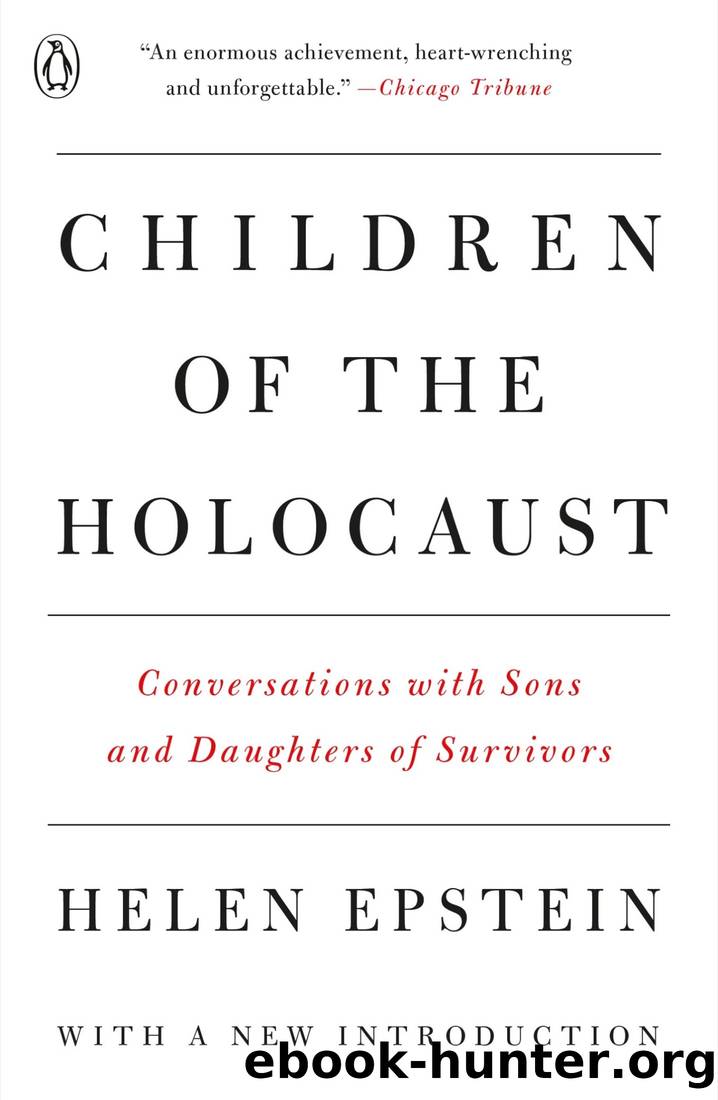Children of the Holocaust by Helen Epstein

Author:Helen Epstein [Epstein, Helen]
Language: eng
Format: epub
Published: 1988-10-02T00:00:00+00:00
ELEVEN
On Sunday afternoons in the late fifties, in Rochester, New York, Ruth Alexander remembers sitting on the public beach at Lake Ontario with the rest of the greeners. They ate sandwiches, kept an eye on their children, and spoke Yiddish, the language they used at home and often at work. Almost all of them were Polish Jews. Many had met before, during the long decade that began with the Nazi invasion of Poland in 1939, and saw them move from ghettos to labor and concentration camps to postwar Displaced Persons camps, and finally to the United States. Most of their eldest children had been born in 1946, in Germany, like Ruthâs older brother, Eugene. The Alexander family had been brought to the United States by the Hebrew Immigrant Aid Society (HIAS), three of nearly 150,000 Jewish DPs relocated between 1947 and 1951.
HIAS had sent the Alexanders first to Cairo, Illinois, and then to St. Louis, Missouri. Neither place felt comfortable and when one of Ruthâs two surviving uncles moved to Rochester, the Alexanders followed. They lived in the very center of the city, the then Jewish section, which boasted five synagogues and the densest concentration of greeners in upper New York State. They worked in the factories of Rochester, where English was not a requisite for work. Jake Alexander, Ruthâs father, had been a tailor before the war and he found work with a uniform manufacturer. Her mother, like many of the greener women in Rochester, stayed home with the children.
By the early sixties, most of the survivors had scattered into the suburbs. They worked six days a week and kept long hours. Many would leave their homes at eight in the morning and work with only a lunch break until eight or nine at night, much as they had done while they were incarcerated by the Nazis. Eventually, some bought businesses of their own. Ruthâs uncle, one of the more successful greeners, owned a fish market; Ruthâs father had opened his own tailor shop. Both still worked six days a week although they were now financially secure.
The survivors who had sat together on the public beach on Lake Ontario now could sunbathe in their own backyards. They drove large cars and some had built ostentatious houses. Although they no longer congregated at âthe kloob,â a branch of the New Americans Club where Ruth and her brother remembered having birthday parties as children, they kept tabs on each other. Their community was hermetic and small. Their children were closely watched and it was for this reason that whenever Ruth returned to Rochester for holidays, she kept a low profile.
âI really hated the greeners when I was a kid,â she told me as we walked down the clean, leafy street where her parents now lived, a street that felt like typical middle-class America. Children rode their tricycles; men were hosing down their cars. Although it was Saturday, Ruthâs father was at his tailor shop. Her mother was at home, cooking.
âI always felt suffocated by the greeners.
Download
This site does not store any files on its server. We only index and link to content provided by other sites. Please contact the content providers to delete copyright contents if any and email us, we'll remove relevant links or contents immediately.
Blood and Oil by Bradley Hope(1250)
Daniel Holmes: A Memoir From Malta's Prison: From a cage, on a rock, in a puddle... by Daniel Holmes(1117)
Ambition and Desire: The Dangerous Life of Josephine Bonaparte by Kate Williams(1087)
Wandering in Strange Lands by Morgan Jerkins(1018)
It Was All a Lie by Stuart Stevens;(941)
What Really Happened: The Death of Hitler by Robert J. Hutchinson(870)
London in the Twentieth Century by Jerry White(848)
Time of the Magicians by Wolfram Eilenberger(844)
Twilight of the Gods by Ian W. Toll(813)
The First Conspiracy by Brad Meltzer & Josh Mensch(812)
The Japanese by Christopher Harding(799)
A Woman by Sibilla Aleramo(796)
Lenin: A Biography by Robert Service(780)
The Devil You Know by Charles M. Blow(779)
Reading for Life by Philip Davis(774)
Twelve Caesars by Mary Beard(768)
Cleopatra by Alberto Angela(765)
1965--The Most Revolutionary Year in Music by Andrew Grant Jackson(715)
The Life of William Faulkner by Carl Rollyson(713)
